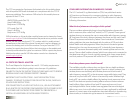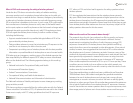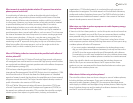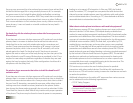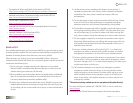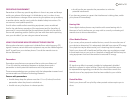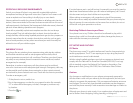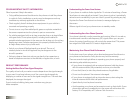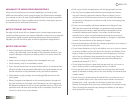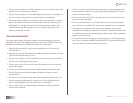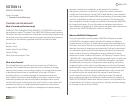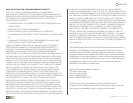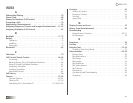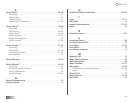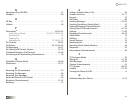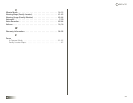
92
BACK to TOC
seCtIon 13 HEALTH AND SAFETY INFORMATION
AVAILABILITY OF VARIOUS FEATURES/RINGTONES
Many services and features are network dependent and may require
additional subscription and/or usage charges. Not all features are available
for purchase or use in all areas. Downloadable Ring Tones may be available
at an additional cost. Other conditions and restrictions may apply. See your
service provider for additional information.
BATTERY STANDBY AND TALK TIME
Standby and talk times will vary depending on phone usage patterns and
conditions. Battery power consumption depends on factors such as network
configuration, signal strength, operating temperature, features selected,
frequency of calls, and voice, data, and other application usage patterns.
BATTERY PRECAUTIONS
• Avoid dropping the cell phone. Dropping it, especially on a hard
surface, can potentially cause damage to the phone and battery. If you
suspect damage to the phone or battery, take it to a service center for
inspection.
• Never use any charger or battery that is damaged in any way.
• Use the battery only for its intended purpose.
• If you use the phone near the network’s base station, it uses less power;
talk and standby time are greatly affected by the signal strength on the
cellular network and the parameters set by the network operator.
• Follow battery usage, storage, and charging guidelines found in the
user’s guide.
• Battery charging time depends on the remaining battery charge and
the type of battery and charger used. The battery can be charged and
discharged hundreds of times, but it will gradually wear out. When the
operation time (talk time and standby time) is noticeably shorter than
normal, it is time to buy a new battery.
• If left unused, a fully charged battery will discharge itself over time.
• Use only Samsung-approved batteries and recharge your battery
only with Samsung-approved chargers. When a charger is not in
use, disconnect it from the power source. Do not leave the battery
connected to a charger for more than a week, since overcharging may
shorten its life.
• Do not use incompatible cell phone batteries and chargers. Some
Web sites and second-hand dealers, not associated with reputable
manufacturers and carriers, might be selling incompatible or even
counterfeit batteries and chargers. Consumers should purchase
manufacturer or carrier recommended products and accessories. If
unsure about whether a replacement battery or charger is compatible,
contact the manufacturer of the battery or charger.
• Extreme temperatures will affect the charging capacity of your battery: it
may require cooling or warming first.
• Do not leave the battery in hot or cold places, such as in a car in summer
or winter conditions, as you will reduce the capacity and lifetime of the
battery. Always try to keep the battery at room temperature. A phone
with a hot or cold battery may temporarily not work, even when the
battery is fully charged. Li-ion batteries are particularly affected by
temperatures below 0° C (32° F).
• Do not place the phone in areas that may get very hot, such as on or
near a cooking surface, cooking appliance, iron, or radiator.
• Do not get your phone or battery wet. Even though they will dry and
appear to operate normally, the circuitry could slowly corrode and pose
asafetyhazard.
• Do not short-circuit the battery. Accidental short-circuiting can occur
when a metallic object (coin, clip or pen) causes a direct connection
between the + and - terminals of the battery (metal strips on the
battery), for example when you carry a spare battery in a pocket or bag.
Short-circuiting the terminals may damage the battery or the object
causing the short-circuiting.



